The Brooklyn-dwelling Timothy Woods in this week’s debut issue of Polarity is far more interesting than the Brooklyn-dwelling Timmy Wood who writes for iFanboy. But then, the former has super powers while the latter…writes for iFanboy (sorry, Timmy). Thing is, Tim isn’t simply dealing with the great power/great responsibility schtick. His primary concern is his bi-polar disorder and the erratic, bare-ass misadventures it ignites. As if his medication’s dulling effects weren’t enough of a drag, he discovers they also nullify some incredible metahuman abilities. What do you do with that information?
We spoke to writer Max Bemis (who also moonlights as the lead singer of Say Anything) about a comic project just as personal as his songwriting:
iFanboy: Let’s get everyone caught up on POLARITY. This is a story about incredible power, but also deep pain. Tell us a little about Tim and his relationship with both his illness and his meds.
Max Bemis: Everyone deals with their illness in a different way but it so happens that Tim is really neurotic and he worries a lot about what people think of him. He has a lot to prove. so that plus the idea that anyone that has a mental illness is going to feel self-conscience for having one. He lives in a society that is pretty vapid and he is trying to fit in. He thinks he’s trying to fit in to get ahead with his art and to do the right thing for his career, but really he just wants to feel normal, and that is kind of Tim’s greatest struggle throughout the beginning of the book.
iF: It’s probably safe to suggest that everyone is touched by mental illness in some form, whether they’ve struggled with it themselves or know someone with a particular aspect of depression, anxiety or worse. For artists, that impact is likely far greater. Do you see it as a snake eating its tail or does it just feel that way?
MB: You know, I’ve discovered that mental illness can be a great subject matter but it isn’t necessarily in and of itself fuel for great art. And I guess in this book Tim sort of has a mixture of those things and the fantastic element that his illness in itself is a gift. It is an ability, whereas for most people, it’s just a hinderant. Tim confuses the traits he gains or loses by being mentally ill with his artistic abilities and later on in the book its sort of something he grabbles with in terms of his powers defining him rather than his mental illness because his mental illness is his powers.
iF: Mental illness is an incredibly sensitive topic, from its depiction in fiction to the terminology we use when speaking about it. How important is authenticity?
MB: I think in general, authenticity is really important as someone that suffers from Bi-Polar disorder. I get offended when certain elements of it are misconstrued. But I think for the purposes of elements, that I exaggerated so that the average person could understand it. I don’t think I mislead anyone in terms of what it feels like to be bi- polar, and I think that’s the important thing. Often times it could be seen as a character flaw, whereas in the book, even though it is exaggerated, and it’s not entirely auto-biographical, I feel like, I’ve just wanted to get across how it feels like to actually have it, and I do.
iF: You’re producing songs for each issue in this series. Can you talk about the process, the chicken and egg aspect of pairing stories and songs?
MB: Well, there is a little bit of the “chicken and the egg” aspect here because so much of the sorry dates back to not only my experiences but also art I’ve created in the past like our first record which I wrote when I was Tim’s age and grappling with mental illness. So you know the seeds for both the songs and the story itself have been around for a really long time. In this case, I did write the script for the book before I wrote the song because I wanted it to kind of be a soundtrack to the book itself.
iF: A number of musicians have taken to the comics medium in recent years. Do you think lyricists have any advantage in scripting, or do you see it as a completely independent skill set? Do you talk about comics with bandmates or anyone else in your touring circles? Any interesting reactions?
MB: I don’t know if those two vocations are essentially linked. I think you have to be a really big fan of comics and have to really understand the medium to be a good at writing comics. Being creative or just the fact that you are in a band and have a creative profession doesn’t make you a good comic writer. Not that I’m saying I am, but at least I have a really deep knowledge of the medium. I am an obsessive comics fan so you know I’ve seen some really amazing stuff and some really weak stuff come from people who want to experiment with comics. And again, I think it really comes down to whether that person is a story teller. I would hope that I have made that transition in some way. I do talk about comics with the people in my band and everyone around me. I give comics to people just to try to get them to read comics. Everyone is aware of my obsession because I bring huge boxes of comics on tour so it’s like no one could really ignore it. And now with the book and everything, it’s an important part of life that I want to keep exploring.
Polarity #1 is on shelves now. Check out a preview of the first issue and an exclusive look at the covers for the fourth and final issue.
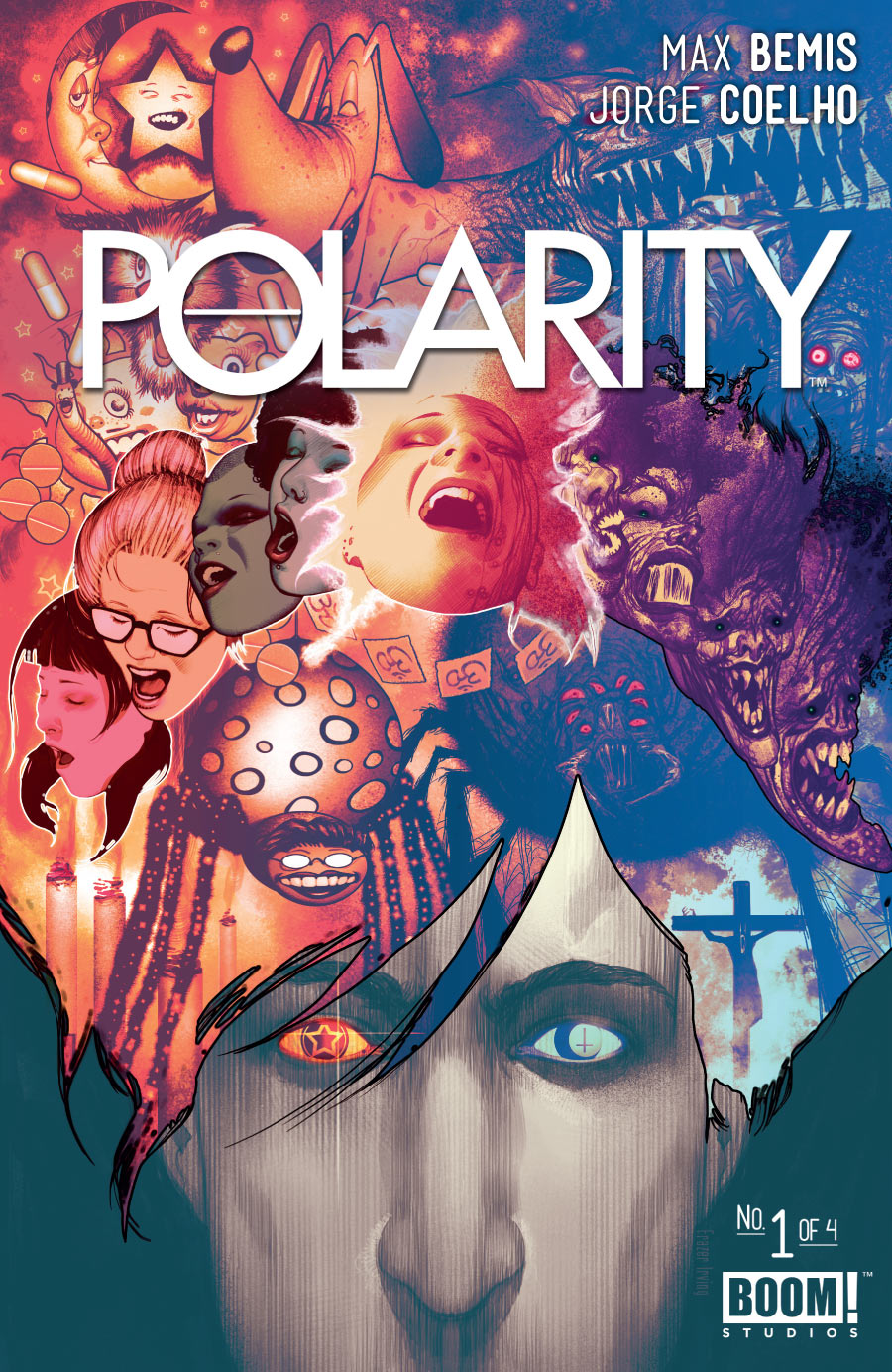
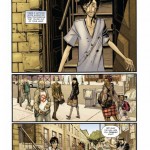
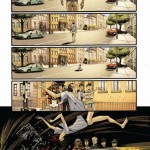
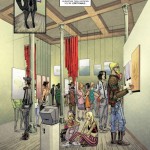
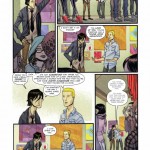
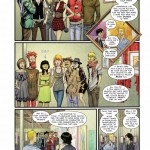

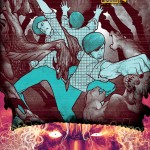


My store better get this, really looking forward to it. Each issue comes with a free song download too…
Got it! Will read it tonight…
Amazing cover by Frazier Irving but the inside? Yet another portuguese artist: Jorge Coelho.